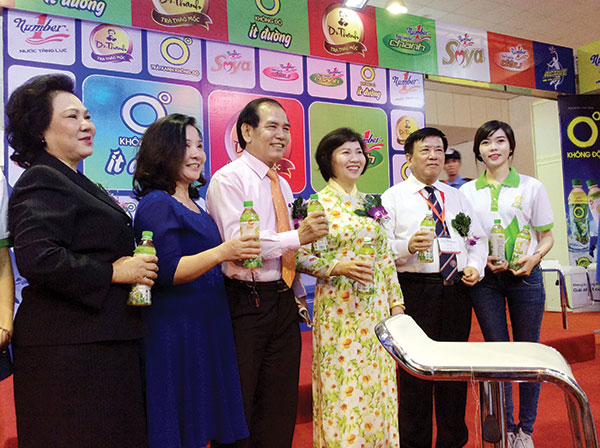Misconduct charges irk trade official
 |
| Deputy Minister of Industry and Trade, Ho Thi Kim Thoa (pictured third from right), Photo: Le Toan |
The matter of transparency in equitised Vietnamese firms has come to the public eye once again as Thoa’s family was found to possess approximately 34 per cent of Dien Quang’s shares. In fact, various members of Thoa’s family have a matrix of intertwined connections with the lighting firm.
First, prior to her appointment as a deputy minister of Industry and Trade in 2010, Thoa had worked at Dien Quang for 18 years and held the highest position of chairwoman and CEO for five years. After leaving Dien Quang to serve as deputy minister, Thoa continued to scoop up shares of the firm throughout the years. She currently owns 4.91 per cent after making multiple purchases.
Thoa’s brother Ho Quynh Hung, meanwhile, became Dien Quang’s chairman and CEO in 2010 when Thoa took office. Hung currently owns 7 per cent of the firm’s shares.
Moreover, Thoa’s daughters and mother also own a substantial amount of the company. Her daughter Nguyen Thai Nga, with 12 per cent ownership, started working for Dien Quang in 2012 and has since been appointed as deputy CEO and board member. This means Nga is reporting directly to her uncle Ho Quynh Hung.
Nguyen Thai Quynh Le, Thoa’s other daughter, is also a shareholder of Dien Quang, owning 6.5 per cent of the company. Tran Thi My Xuan, Thoa’s mother, has purchased 3.83 per cent of the firm thus far.
Another curious family tie is Thoa’s other brother Ho Duc Lam, who is the chairman and CEO of Rang Dong JSC, Dien Quang’s major competitor in the Vietnamese lighting equipment market. In other words, the two brothers run their own lighting firms while their sister has significant shares in one and simultaneously serves in office.
The controversy goes deeper with Ho Duc Dung – Ho Duc Lam’s son and nephew to Thoa and Ho Quynh Hung. In 2014, Dung bought VND25.74 billion ($1.17 million) worth of Dien Quang’s shares, which were put on sale by State Capital Investment Corporation as part of the divestment plan. A year later, Dung sold the entire stake to his uncle Ho Quynh Hung.
The complexity of Thoa’s involvement in Dien Quang, all while serving as a deputy minister, has raised questions of whether she has committed any serious legal infractions.
On February 16, Nguyen Phu Trong, Party General Secretary, ordered relevant authorities to look closely into this issue.
Nguyen Hoang Hai, deputy head of the Vietnamese Financial Investors’ Association, told VIR that there is a legal gap on this matter. He urged the government to investigate whether as a deputy minister, Thoa has launched any regulations in favour of Dien Quang.
“We need to find out if any regulations or laws have given Dien Quang an undeserved edge against its competitors in the market. Moreover, Thoa has been accused of buying Dien Quang’s stocks at low prices to benefit from price surges afterwards. This also requires further investigation,” said Hai.
Truong Thanh Duc, a lawyer at BASICO law firm, noted that public officials are prohibited from setting up or running their own companies in Vietnam. However, there has yet to be any rules on the officials’ share ownership in equitised firms.
“Due to this ambiguity, the deputy minister does not seem to have broken any laws outright. That said, the Ministry of Industry and Trade, where Thoa serves, has direct control over Dien Quang, so there is the possibility of a conflict of interest,” said Duc.
What the stars mean:
★ Poor ★ ★ Promising ★★★ Good ★★★★ Very good ★★★★★ Exceptional
Latest News
More News
- State corporations poised to drive 2026 growth (February 03, 2026 | 13:58)
- Why high-tech talent will define Vietnam’s growth (February 02, 2026 | 10:47)
- FMCG resilience amid varying storms (February 02, 2026 | 10:00)
- Customs reforms strengthen business confidence, support trade growth (February 01, 2026 | 08:20)
- Vietnam and US to launch sixth trade negotiation round (January 30, 2026 | 15:19)
- Digital publishing emerges as key growth driver in Vietnam (January 30, 2026 | 10:59)
- EVN signs key contract for Tri An hydropower expansion (January 30, 2026 | 10:57)
- Vietnam to lead trade growth in ASEAN (January 29, 2026 | 15:08)
- Carlsberg Vietnam delivers Lunar New Year support in central region (January 28, 2026 | 17:19)
- TikTok penalised $35,000 in Vietnam for consumer protection violations (January 28, 2026 | 17:15)
















 Mobile Version
Mobile Version